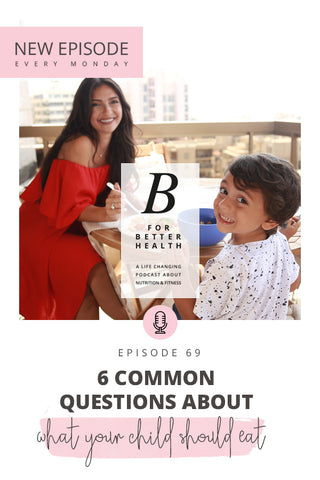

Are you wondering what you should feed your child? Whether you’re a mother in Dubai, UAE, London, Jordan, Lebanon, KSA, USA, or anywhere else in the world, your child’s health and nutrition is a constant priority for you. For some of you, it’s a battle of uncertainty, questions, and confusion, which is why I’m glad you’re here! I talked to an expert in the field of child nutrition and have prepared this post for the 6 most common questions about what your child should eat. If you’d rather listen to the answers, head over to my podcast page and you’ll find the episode waiting for you.
Meet Mirna Sabbagh, Nutritionist and Lactation Consultant in Dubai
My sister Mirna is a young mom, nutritionist, and lactation consultant living in Dubai. She wants to share all the child nutrition answers with mothers in the Middle East and the rest of the world. With her online courses and Instagram page, she’s tackling the hard questions and solving the struggles mothers have with their children’s eating. Why is my toddler a picky eater? Is my child the right weight? Should I be feeding my baby dairy?
The First 1,000 Days Of A Child’s Life

Whatever a mother eats in the first 1,000 days of a child’s life will have the most impact later on. That means that from the moment a woman finds out she’s pregnant until the child is almost TWO is a pretty important phase that determines their eating habits in adulthood. Find out how to improve on that with your own children or share it with family to help out your niece, nephew, or grandchild.
Let’s get to the 6 common questions about what your child should be eating!
1. Does pregnancy impact what the child ends up eating?

As mentioned, what a woman eats during and after pregnancy is pretty significant on the child until they are at least 2 years old. Depending on what the mother’s diet was and how she ate after giving birth can turn on or off specific gene expressions in a child. Basically, we all have certain genes that can be turned on or off depending on environmental factors.
To give a simplified example, If a mother ate high sugar foods while pregnant, she can turn on the obesity genes in her child’s body. If a mother consumes a healthy diet, her child will grow up to have a natural preference for vegetables. Same goes for a mother consuming a high-fat diet, her offspring will grow up to prefer the same type of food. It’s not just about diets! We see women who gain too much weight during pregnancy, which can also have an impact on whether the child will have obesity or cardiovascular diseases or an appetite that’s larger than other kids.
Myth Buster: Many people think if a woman just gave birth, she needs to be eating more to be able to breastfeed. As it turns out, overweight women in pregnancy end up making less milk!
(For more info like this, check out Mirna’s Breastfeeding course, it’s SO interesting and helpful if you’ve just given birth!)
2. Should I give dairy to my one-year-old child?

One of the more controversial topics, should 1-year-olds be having dairy? The simple answer is a mother should try to breastfeed at least until the child is 2 years of age. It’s the healthiest option compared to what else is out there. The World Health Organisation actually bans brands from marketing infant formula (artificial and powder milk) as it could convince the mother she doesn’t need to breastfeed.
Now, why is it that they can’t market it to infants? Because the formula isn’t as good for them! It’s filled with additives, sugar, and oil. When it comes down to formula for older kids, the AAP finds it expensive and unnecessary and recommends regular milk instead. Read Mirna’s full article on this topic.
If you’re going to give your 1-year-old milk, go for ORGANIC cow’s milk or yogurt. It’s a good way to get your child the vitamins and minerals they need. Why organic? Because nowadays, the cows producing milk are consuming antibiotics, hormones, and inflammatory omega 6 rich foods.
Alternatively, you can give calcium-fortified coconut milk, almond milk, or oat milk.
3. How much sugar should I give my child?
Sugar is at the core of weight gain. It’s found in a lot of food marketed towards babies and children! High sugar causes more cravings, and children are more susceptible to the taste than adults are. They’ll choose it over everything! They love the taste and since they can’t taste the same amount of sugar in vegetables, they’ll think why on earth should I have anything other than chocolate?
Just like with adults, if you cut out sugar for 10 days and then eat a vegetable, it’ll suddenly taste a lot better! That goes for children and picky eaters, once you reduce that high sugar intake, they’ll start to enjoy other foods a whole lot more.
It doesn’t have to be an all-or-nothing mentality! Talk to your children and explain why sugar isn’t healthy. Don’t tell them sugar is bad and they should avoid it at all costs. Tell them excess sugar can be harmful but they can have a piece or two on special occasions. Don’t keep it around the house and expect the child to think rationally. If you’re at a birthday party, by all means, let them eat cake! Have a slice yourself if you’re in the mood. That way they can see there’s a balance and you’re following it, too. If they ask for ice cream on a random day, tell them they had sugar yesterday and it would be bad for their teeth. You need to convince them, not argue with them.
Even as adults, a lot of the time we don’t know how much sugar we’re consuming. There’s so much to uncover, which you can find in Mirna’s course. There’s an entire section on sugar that’s going to be so useful for you and your child!
4. My child doesn't eat! What do I do?

With picky eating, there isn’t one magic solution! It depends on the reason, Mirna discusses this in detail in her article about picky eating:
- Have you checked if your child has a vitamin deficiency? Because if they did, it would explain the lack of appetite. Also, check for B12 and zinc deficiencies.
- Does your child have any allergies? Consult an expert, they could have had a bad reaction to something they ate and are afraid to relive that.
- It could be psychological. Maybe they choked one time and got scared of eating in general.
- Perhaps they have sensory problems and there’s too much happening at the dinner table for them to calm down and eat.
- And lastly, it could be they don’t like certain textures of food you make.
Another explanation could be your child has been grazing all day (eating snacks here and there), so when they sit down for the main meal, they’re not hungry. Always refer back to the sugar intake; if they’re having too much sugar then they won’t want to eat any protein or vegetables.
One major reason for picky eaters is they’re trying to get your attention. If a child isn’t eating, and they notice their parents care a lot about this, it becomes part of their dynamic.
Solving picky eating has to do with understanding the reason and then providing a strategy to solve the issue. Some days the answers are simple and straightforward and other days it’s a combination of reasons.
5. My child is overweight, what do I do?
The most important thing is to not make this about you as a parent. If you think, “How did I let this happen?” it could be psychologically traumatizing for your child to hear that. First, accept that it’s all right. It’s all-manageable! Next, create a strategy with an EXPERT. That’s right, you shouldn’t take matters into your own hands and decide to cut off carbs from your child’s diet. Children need carbs! If they think something is not allowed, they’ll start to hide things from you.
You might think you’ll just get them moving more to lose weight. But if the food doesn’t change, nothing will happen. Talk to a children’s dietician in Dubai or wherever else you might live. You wouldn’t take your child to a dentist for adults and scar them from the dentist forever! You need someone that knows how to talk to children and someone that’s aligned with your parenting techniques. Don’t be that authoritative figure in your child’s life, because even if they lose weight, you’ll end up ruining your relationship with them if you take their weight into your own hands.
6. What are the best foods to improve my child's immunity?

There is no quick fix to improve your child’s immune system. Always look at the underlying reason: why is it weak? What vitamins are missing? In general, Mirna is always encouraging the foods that nourish your microflora, because 80% of our bodies’ immunity is in the gut. Things like fruits, veggies, prebiotics, and probiotics can improve our immunity.
A healthy diet is good for all the organs in the body! Focus on foods like honey, garlic, and onion, as they can support immunity better than anything. Keep in mind to give your child honey after the age of one.
More Child Nutrition Questions And Answers On B For Better Health
I hope you guys liked that! I’ve got more bonus questions and answers on the podcast episode. Again, if you’re still unsure or in doubt when it comes to feeding your child, you can always get in touch with Mirna. She’ll be glad to help, and after a few courses with her, you can be your own child’s dietician!
Subscribe to one of the top 5 UAE podcasts.
Stay connected with news and updates!
Join our mailing list to receive the latest news and updates from our team.
Don't worry, your information will not be shared.
We hate SPAM. Great content only!



